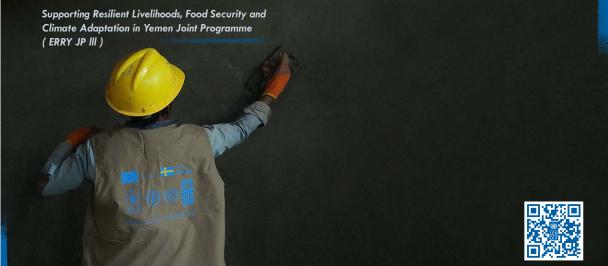The tremendous increase in fuel prices and Yemen’s frequently failed public electricity grid have left citizens with few options: they can install individual solar systems in their homes or subscribe to a private diesel-powered energy grid. Both options are expensive and renewable energy is too costly for many Yemenis. No matter the option, the cost adds significant financial burdens to already financially stressed homes.
Before 2015, only 23 per cent of Yemenis had access to energy; the crisis has led to a deeper energy-related problem as fossil fuels continue to surge and embargos make it more difficult to obtain. The energy shortage also affects businesses including micro, small and medium enterprises and the private sector – all of which have severely suffered due to the lack of alternative energy access.
The United Nations Development Programme (UNDP)-managed joint project, the Enhanced Rural Resilience in Yemen (ERRY), intervened to address access to affordable energy for Yemen's most vulnerable population while also economically empowering women and youth to help support their families. We designed and developed a unique, low-cost solar microgrid solution that uses our 3x6 approach for longer term sustainability.1 Our solar microgrids offer an alternative, clean and renewable energy source that allows rural homes the ability to afford undisrupted electricity for hours.
Before the crisis, the cost of 20 litres of diesel was USD 7. Now it hovers around USD 17 and is not readily available on the market and in stations. The solar microgrids create alternative energy options that can be a better source than diesel because it is clean energy with a low cost and is easily replicated in rural areas, impacting large numbers of Yemenis. Our project has been successful at cutting the cost of energy by an amazing 65 per cent. Instead of diesel costing 42 center an hour, solar energy costs only 2 cents, making it more affordable to the average Yemeni.
Currently, UNDP’s solar micro-grids provide a solution and hope for three frontline communities of the conflict in Hajjah and Lahj. UNDP’s project is supported by the European Union and implemented by the Sustainable Development Foundation (SDF) and CARE International. And it was recently nominated for the prestigious Ashden Award in Humanitarian Energy which focuses on identifying the most exciting climate action around the world.
Together with our partners, we train vulnerable women and youth how to establish, manage, maintain and promote their solar micro-grid businesses. The businesses help Yemenis move from humanitarian assistance to sustaining themselves and helping their communities with their businesses. The project is well-timed and has come during a period when more limitations and challenges are occurring around simply providing multiple cash grants to sustain households/individuals.
The acceptance rate of these community initiatives are very high as they benefit the environment, bring regular income to women, youth and their families and they improve the communities. All microgrids are joint ventures where participants collectively pool their seed funding to enable them to establish at-scale businesses within their local communities, giving individuals a sense of ownership in the businesses success.
For the three microgrid stations, seed grant money worth USD 27,000 (USD 900 x 30 vetted participants) was provided to help procure solar panels, batteries, cables, meters, identification of sites, and necessary arrangements to establish the business. Additionally, beneficiaries in our programmes receive cash assistance to help meet their living needs while learning how to establish a solar microgrid business.
For the first time in their communities, the women and youth were trained as solar technicians which changed the community's perception of their roles in society. The solar microgrid and individual businesses have provided women and youth with a dignified income opportunity to feed and support their families, and they have become solar energy activists and role models in their community.
Given the recent threat of COVID-19 in Yemen, the experience has demonstrated that the business is suitable to adopt the preventive measures such as social distancing and handwashing while still providing the essential service. More importantly, sustaining their micro-business during the pandemic will enable the women and youth to overcome the shocks of any COVID-19 impact.
Yemen’s solar microgrid stations bring hope that being able to adapt to external shocks is vital and renewable energy can play an integral part in providing replicable, bottom-up, low cost and sustainable solutions for humanitarian and development crises.
1 An innovative programme, UNDP’s 3x6 approach promotes sustainable livelihoods for vulnerable and crisis-affected groups. It uses skills, resources and local expertise to support crises-affected people to become financially independent and thus able to contribute to local economic recovery and the transition from an emergency response to a sustainable development path.

 Locations
Locations


